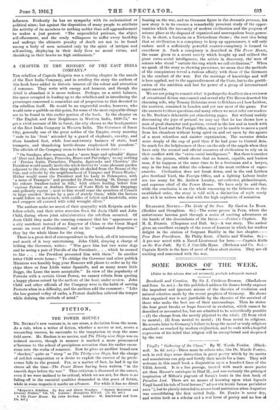FICTION.
THE POWER HOUSE.j- Mn. BUCHAN'S new venture is, in one sense, a deviation from the norm. As a rule, when a writer of fiction, whether a novice or not, scores a resounding success, he succumbs to the temptation to reap the same field anew. Mr. Buchan is no novice, and The Thirty-nine Steps was no isolated success, though in manner it marked a more pronounced adherence to the school of precipitous sensation than his earlier excur- sions into the realm of romance. Now he gives us another brand-new " ehocker," quite as " steep " as The Thirty-nine Steps, but tho charge of red-hot composition or a desire to exploit the success of its prede- eeSsor falls to the ground. For, as a matter of fact, he had it up his sleeve all the time—The Power House having been written " in the smooth days before the war." Thus criticism is disarmed at the outset, even if we were inclined to be critical, which we are not, for there is no falling-off in the essential qualities demanded in this genre of fiction, while in some respects it marks an advance. For while it has no direct
*Keiowin's Rebellion. By Ray and Oliver Strachey. " Oxford Historical and literary Studies," Vol. VI. London: Humphrey Milford. (7s. ed. net.] t The Power House. By John Buchan. London: W. Blackwood and Sons. Ils. net.]
bearing on the war, and no Germans figure in the dramatis personae, his new'story is in its essence a remarkably prescient study of the oppor- tunities which the insecurity of modern civilization and the progress of science place at the disposal of organized and unscrupulous brain-power. It is, in short, a fantasia on a Nietzsehean theme ; the root idea being that as civilization is a conspiracy to keep up appearances, it will only endure until a sufficiently powerful counter-conspiracy is formed to overthrow it. Such a conspiracy is described in The Power House, the name kiven to a secret society which bought up and utilized the great extra-social intelligences, the artists in discovery, this+ men of science who stand " outside the ring which we call civilization." When we speak of the story as showing prescience, we mean that the methods of the conspirators reveal a Curious affinity with those of the Germans in the conduct of the war. But the marriage of knowledge and will is here applied, not to the aggrandizement of the State, but to the gratifi- cation of the ambition and lust for power of a group of international super-ans. robs.
We are not going to commit what is perhaps the deadliest sin a reviewer of sensational fiction can commit and reveal why Pitt-Heron deserted his charming wife, why Tommy Deloraine went to Bokhara and how Leithen, the narrator, remained in London and yet saw most of the game. For the answers to these questions and many others we must refer our readers to Mr. Buchan's delectable yet stimulating pages. But without unduly discounting the joys of perusal, we may say that he has shown how a man of good character and position, versed in the law and in touch with Scotland Yard and the Foreign Office, may yet be unable to move a yard from his chambers without being spied on and set upon by the agents of a most relentless and sinister organization. The narrator drinks more deeply of the cup of peril than if he had gone to Central Asia. So much for the helplessness of those on the side of the angels when they have only the normal and official resources of civilization to rely on in their conflict-with the "extra-social intelligences." But there is another side to the picture, which shows that an honest, capable, and fearless man, if ho happens at the same time to be a Scotsman and a lawyer, may in the long run defeat the schemes of the most ruthless of super- anarchs. Civilization does not break down, and in the end Leithen plus Scotland Yard, the Foreign Office, and a fighting Labour leader are too many for Mr. Andrew Lumley, art-collector, philanthropist, and supreme chief of the Power House. We have only to add that, while the conclusion is on the whole reassuring to the believers in tho established order, the story is told with a distinction of style rarely met wi.h in writers who deal with the high explosives of sensation.


































 Previous page
Previous page